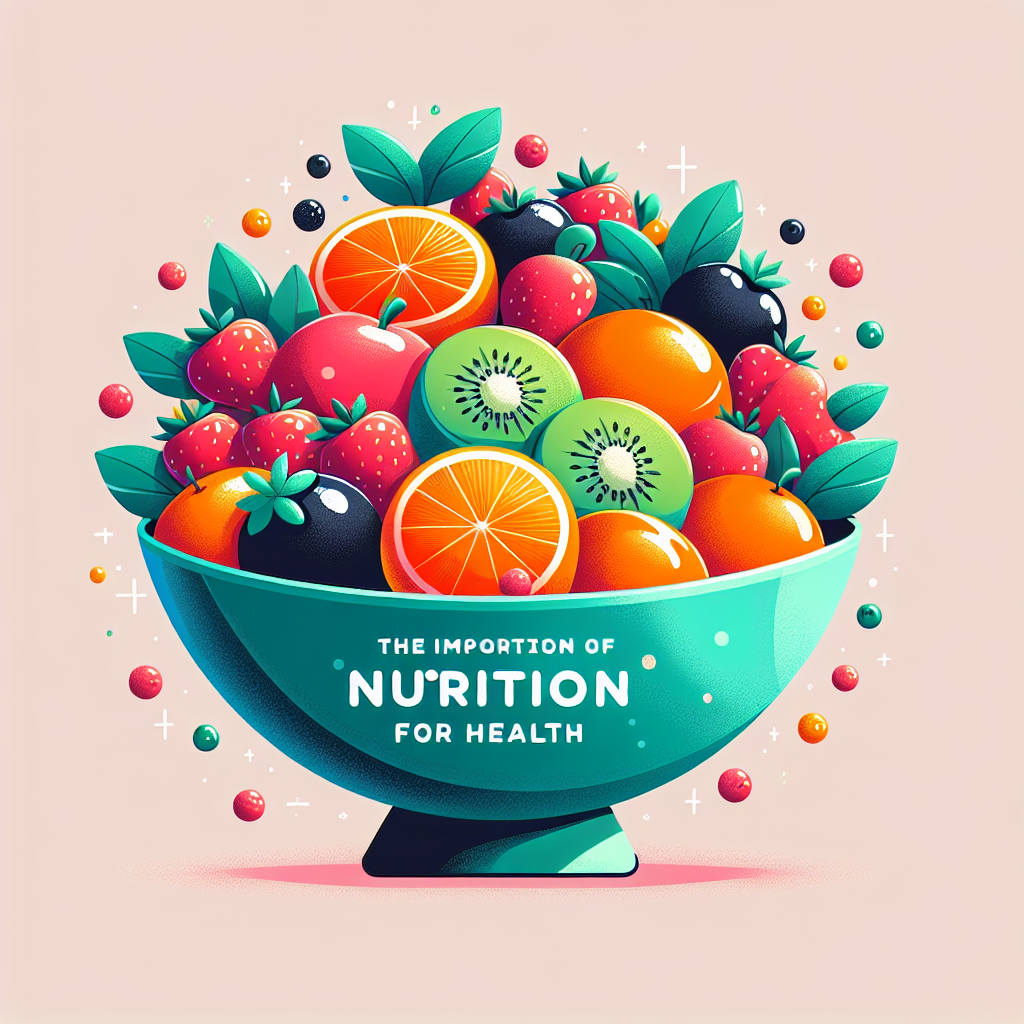Proper nutrition plays a crucial role in maintaining good health. In an era where fast food and processed snacks dominate our meals, it is imperative to understand the significance of consuming a well-balanced diet. This article aims to shed light on the importance of nutrition for our overall well-being. By providing essential nutrients, vitamins, and minerals, a healthy diet can promote better physical and mental health, boost our immune system, enhance energy levels, and reduce the risk of chronic diseases. Through an exploration of various aspects of nutrition, we hope to equip our readers with valuable knowledge to make informed choices about their dietary habits.
Why is Nutrition Important?
Proper nutrition is crucial for maintaining good health and overall well-being. It provides us with essential nutrients that our bodies need to function efficiently and effectively. By ensuring we have a well-balanced diet, we can help prevent diseases, maintain a healthy weight, and support our mental and cognitive functions. In this article, we will explore the role of macronutrients and micronutrients in our health, examine the impact of nutrition on physical and mental well-being, discuss the importance of a balanced diet, the benefits of adequate hydration, and how poor nutrition can negatively affect our health. Additionally, we will provide tips for maintaining a healthy nutritional lifestyle and discuss the importance of proper nutrition in different life stages.
The Role of Macronutrients in Health
Carbohydrates
Carbohydrates are an essential macronutrient that provides our bodies with energy. They are the main source of fuel for our muscles and brain. Carbohydrates can be found in foods such as bread, rice, pasta, fruits, and vegetables. However, not all carbohydrates are created equal. It is important to focus on consuming complex carbohydrates, such as whole grains and legumes, as they provide a sustained release of energy and essential fiber.
Proteins
Proteins are vital for the growth, repair, and maintenance of tissues in our bodies. They are made up of amino acids, which are the building blocks of life. Proteins can be found in foods such as meat, fish, eggs, dairy products, and beans. It is important to consume a variety of protein sources to ensure we get all the essential amino acids our bodies need.
Fats
Fats are another important macronutrient that provides our bodies with energy. They also aid in the absorption of fat-soluble vitamins and help maintain healthy skin and hair. Fats can be found in foods such as oils, butter, avocados, nuts, and fatty fish. It is important to focus on consuming healthy fats, such as monounsaturated and polyunsaturated fats, while limiting unhealthy saturated and trans fats.

The Role of Micronutrients in Health
Vitamins
Vitamins are micronutrients that our bodies require in small amounts but play a crucial role in various bodily functions. They are necessary for maintaining healthy skin, bones, and teeth, and supporting our immune system. Vitamins can be found in various foods, including fruits, vegetables, dairy products, and fortified cereals. It is important to consume a variety of fruits and vegetables to ensure we get a wide range of vitamins.
Minerals
Minerals are essential for the proper functioning of our bodies. They are involved in various processes such as nerve function, bone health, and fluid balance. Minerals can be found in foods such as meat, dairy products, whole grains, fruits, and vegetables. It is important to consume a well-balanced diet to ensure we get an adequate amount of minerals.
The Impact of Nutrition on Physical Health
Maintains a Healthy Weight
Proper nutrition plays a crucial role in maintaining a healthy weight. A well-balanced diet that includes appropriate portion sizes, adequate macronutrients, and regular physical activity can help support weight management. Consuming nutrient-dense foods and avoiding high-calorie, low-nutrient foods can prevent weight gain and reduce the risk of obesity-related diseases.
Supports Immune Function
Nutrition is closely linked to our immune system. Consuming a variety of fruits and vegetables, which are rich in vitamins and antioxidants, helps strengthen our immune system and protects us from infections. Additionally, adequate protein intake is necessary for the production of antibodies and immune cells that fight off harmful bacteria and viruses.
Boosts Energy Levels
The food we eat provides the energy our bodies need to perform daily activities. By consuming a well-balanced diet that includes carbohydrates, proteins, and healthy fats, we can maintain stable energy levels throughout the day. Avoiding highly processed foods and sugary snacks can prevent energy crashes and promote sustained energy levels.

The Relationship Between Nutrition and Mental Health
Enhances Mood
Nutrition plays a significant role in our mental well-being. Consuming foods rich in omega-3 fatty acids, such as fatty fish and walnuts, can help reduce symptoms of depression and anxiety. Additionally, a healthy diet that includes a variety of fruits and vegetables provides essential nutrients for brain health, helping improve overall mood and emotional well-being.
Reduces Risk of Mental Disorders
Proper nutrition can help reduce the risk of developing mental disorders. Research has shown that a diet rich in whole grains, lean proteins, fruits, and vegetables is associated with a lower risk of depression, attention deficit hyperactivity disorder (ADHD), and Alzheimer’s disease. On the other hand, a diet high in processed foods, saturated fats, and added sugars may increase the risk of these disorders.
Improves Cognitive Function
Nutrition also plays a crucial role in maintaining cognitive function and preventing age-related cognitive decline. Consuming foods rich in antioxidants, such as berries and leafy greens, can help protect brain cells from damage. Additionally, omega-3 fatty acids found in fish oil and walnuts have been shown to improve memory and cognitive performance.
The Importance of a Balanced Diet
Including a Variety of Foods
A balanced diet is essential for providing our bodies with all the necessary nutrients. It involves consuming a variety of foods from different food groups, including fruits, vegetables, whole grains, lean proteins, and healthy fats. Each food group provides specific nutrients that are important for our overall health. By including a variety of foods in our diet, we can ensure we get a wide range of essential nutrients.
Portion Control
In addition to eating a variety of foods, portion control is also important for maintaining a balanced diet. Controlling portion sizes helps prevent overeating and supports weight management. It is important to listen to our body’s hunger and fullness cues and to eat until we are satisfied, not overly full.
Meeting Nutritional Needs
A balanced diet should meet all of our nutritional needs. This includes consuming an adequate amount of calories, macronutrients, and micronutrients. It is important to pay attention to the recommended daily intake of vitamins, minerals, and other essential nutrients and adjust our diet accordingly. Consulting with a healthcare professional or registered dietitian can help determine our specific nutritional needs.
The Benefits of Adequate Hydration
Regulates Body Temperature
Hydration is essential for regulating body temperature. Water helps maintain the balance of bodily fluids and aids in the process of sweating, which cools down our bodies in hot weather or during physical activity. Staying hydrated can prevent overheating and dehydration, which can have negative effects on our physical performance and overall well-being.
Flushes Out Toxins
Drinking an adequate amount of water helps flush out toxins from our bodies. Water supports kidney function, which is responsible for filtering waste and toxins from our blood. Staying hydrated ensures proper kidney function, allowing for efficient elimination of toxins and waste products.
Supports Digestion
Proper hydration is crucial for maintaining healthy digestion. Water helps soften stool, preventing constipation. It also aids in the digestion and absorption of nutrients from food, ensuring our bodies can extract maximum nutrition from the foods we consume. Staying hydrated can help prevent digestive issues such as bloating, indigestion, and gastric discomfort.
The Impact of Poor Nutrition on Health
Increased Risk of Chronic Diseases
Poor nutrition is closely associated with an increased risk of chronic diseases. A diet high in saturated fats, added sugars, and processed foods can lead to obesity, cardiovascular diseases, type 2 diabetes, and certain types of cancer. Consuming a diet lacking in essential nutrients can also weaken the immune system, making us more susceptible to infections and diseases.
Impaired Cognitive Function
A diet lacking in essential nutrients can have a negative impact on cognitive function. Nutrient deficiencies, especially in vitamins and minerals, can impair memory, attention, and overall cognitive performance. Furthermore, an unhealthy diet that is high in processed foods and low in antioxidants has been linked to an increased risk of neurodegenerative diseases such as Alzheimer’s and dementia.
Weakened Immune System
Poor nutrition weakens our immune system, making us more susceptible to infections and illnesses. Inadequate intake of vitamins, minerals, and antioxidants compromises the functioning of our immune cells, reducing their ability to fight off harmful bacteria and viruses. This can lead to increased incidence and severity of infections, slower wound healing, and prolonged recovery.
Promoting Nutrition in Different Life Stages
Prenatal and Childhood Nutrition
Proper nutrition during the prenatal stage and early childhood is essential for optimal growth and development. Expectant mothers should focus on consuming a well-balanced diet rich in folate, iron, calcium, and other essential nutrients. Breastfeeding provides newborns with important antibodies and nutrients, and introducing a variety of healthy foods during the weaning phase helps establish good eating habits for life.
Adolescent Nutrition
Adolescence is a time of rapid growth and development, making proper nutrition crucial during this stage. Teenagers need increased amounts of energy, protein, vitamins, and minerals to support their growth spurt. Encouraging healthy eating habits, including a variety of fruits and vegetables, lean proteins, and whole grains, can help meet their nutritional needs and establish a foundation for lifelong health.
Adult and Senior Nutrition
Nutrition continues to be important throughout adulthood and into the senior years. Adhering to a well-balanced diet that includes lean proteins, whole grains, fruits, vegetables, and healthy fats supports proper bodily functions and helps prevent age-related diseases. Adequate calcium and vitamin D intake is particularly important for older adults to maintain bone health.
Tips for Maintaining a Healthy Nutritional Lifestyle
Prepare Meals at Home
One of the best ways to ensure a healthy nutritional lifestyle is to prepare meals at home. This allows us to have greater control over the ingredients used and the portion sizes. Home-cooked meals often contain less added sugars, unhealthy fats, and sodium compared to restaurant or packaged meals. Additionally, cooking at home can be a fun and creative way to explore new foods and flavors.
Read Food Labels
Reading food labels is essential for making informed choices about the foods we consume. It allows us to understand the nutritional content, portion sizes, and ingredients of the products we buy. Paying attention to the amount of added sugars, unhealthy fats, and sodium in packaged foods can help us make healthier choices and prevent the consumption of empty calories.
Limit Processed and Sugary Foods
Processed foods are often high in unhealthy fats, added sugars, and sodium, and provide minimal nutritional value. Consuming excessive amounts of processed foods can lead to weight gain, increased risk of chronic diseases, and poor overall health. Limiting the intake of processed foods and sugary beverages is important for maintaining a healthy nutritional lifestyle.
In conclusion, nutrition plays a vital role in maintaining good health and overall well-being. By providing essential nutrients, promoting disease prevention, supporting physical and mental health, and contributing to a balanced diet and adequate hydration, nutrition is a cornerstone of a healthy lifestyle. By understanding the importance of nutrition and implementing tips for maintaining a healthy nutritional lifestyle, we can optimize our health at every stage of life.

